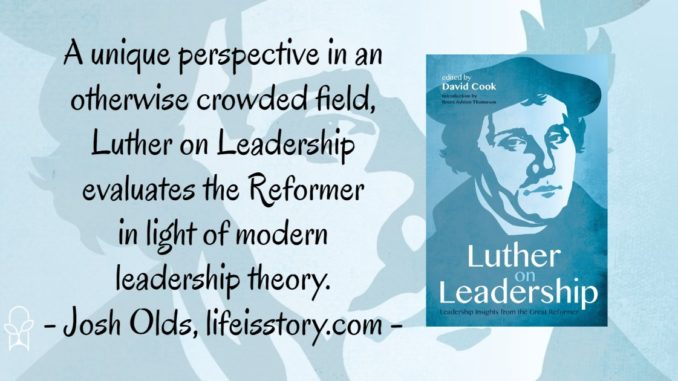
Published by Wipf & Stock Publishers on December 5, 2017
Genres: Academic, Non-Fiction, Leadership, Theology
Buy on Amazon
Goodreads

As a leader, Martin Luther shook the world. Yet, oddly enough, while a great deal has been written about his life, theology, and legacy, few authors have taken the time to examine his leadership characteristics. Luther on Leadership fills this gap by examining his life in light of modern leadership theories. This book looks at Luther's life from a variety of angles to show why he was such an effective leader. With chapters focusing on Luther as a change agent, transformational leader, adaptive leader, and more, this work will help the reader understand why Luther transformed the landscape of Europe. Examining not only his theological contributions, but also his contributions in fields such as law, politics, economics, and education, Luther on Leadership aims to give a holistic picture of Luther as a leader in many areas of society.
Martin Luther, the Great Reformer, is one of the most well-known leaders of an era and yet very little has been written specifically on his practical or theoretical outlook on leadership. Luther’s writings and his actions, taken contextually, can serve as examples for pastoral and other types of leadership today. This edited work, Luther on Leadership, seeks to evaluate the reformer on the basis of modern leadership theory.
It is important to note that Luther on Leadership is looking back historically with modern lenses. The second part of the book talks about Luther as a “change agent” and as being an “adaptive leader” and a “transformational leader.” Those terms wouldn’t have meant anything to Luther but do represent modern models of leadership theory. I do appreciate that the authors recognize this and show how Luther’s philosophies aren’t precursors to modern theory but have elements that fit various styles and methodologies. It’s great for seeing that, however leadership is defined or described or idealized, there are some elements that remain consistent throughout the generations.
The first third of the book is basically an introduction to Luther to set the context for his leadership value. While the section on his theological beliefs may ruffle the feathers of some Lutherans, it’s overall a fair and balanced approach to Luther’s thinking. I did find it interesting that this volume on Luther was primarily written by Southern Baptist scholars. All contributors, save one—Gronberg, who writes on Luther as adaptive leader—are professors at Dallas Baptist University. That does offer some “flavor” to the book, but the Baptist tendencies aren’t so obvious as to be called a bias.
Some of the book’s highlights are its contrast of Luther’s transformational style with the transactional nature of religion in his day, its reminder that leadership is not equal to success, and its evaluation of not just Luther’s writings but his actions as well. As presented here, there’s not much that’s novel or exceptionally different than what many, many leadership books have already said. But one of the shortcomings of many modern leadership theories is that they remain relatively untethered to history. The authors of Luther on Leadership manage to draw ties from Luther to modern leadership theory without co-opting him or recontextualizing him for their own purposes.
I also appreciate that Luther on Leadership takes time to gently critique some of the more popular leadership schticks and suggest that the best formulation is more nuanced and less assured than some books and methodologies might suggest. In the end, this book is a practical outline of Luther’s model of pastoral leadership and how it intersects with modern thinking. If you’re looking for a book just on leadership, this probably isn’t the one for you. If you Lutheran, this book may hold more value—just be aware that only one chapter is from an ECLA scholar. But with Protestantism in general becoming more interested in their roots and with leadership books being all the rage, this is a good crossover that fills some gaps and is able to talk about what’s been talked about over and over again with a different and refreshing perspective.
